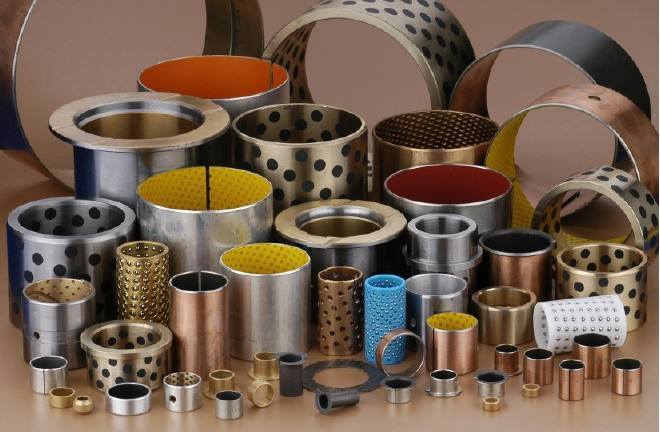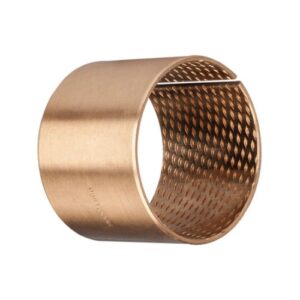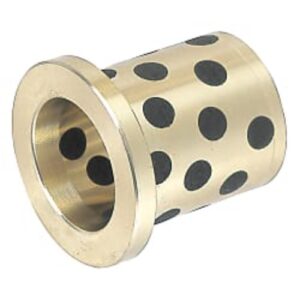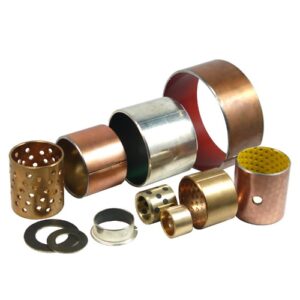Self-Lubricating Bearings
- ISO 9001: 2015 Certified
- Tier 1 manufacturer of Self-lubricating Bearings
- Various Materials
- Low MOQ and Customizable
Bushing MFG can manufacture self lubricating material out of plastics, metal, bronze/brass, graphite plugged bronze, and all kinds of oilless bearings with applications to various industries, like motion system, aerospace, 3d printing, hydraulic systems and more.
Contact our sales assistant for the self greasing bearings catalogue.
Request a Quotation for Your Dry Bearings
Bushing MFG accepts orders for any type of self lube bearing made from special base material or custom bushing and ball bearings with a minimum quantity required.
Related Products
Everything you need to know about self-lubricating bearings
Self-lubricating bearings are a type of bearing that does not require any external lubrication and is maintenance-free or preventative maintenance. This type of bearing is made up of two metal surfaces that are separated by a layer of oil. When the two surfaces move against each other, the oil is forced out and provides a film of lubrication between the two surfaces. This helps to reduce friction and wear between the mating surface.
Table of Contents
What are self-lubricating bearings?
Self-lubricating bearings are components used in a wide range of machines and devices. These special bearings eliminate the need for external lubrication, helping them to function more efficiently and reliably over time. They typically consist of a solid surface that is impregnated with a greasy fluid, which creates a near-frictionless protective barrier between moving parts. Because they eliminate the need for regular lubrication, self-lubricating bearings can be used in applications where oil or other lubricant aging would be difficult to access or maintain. They are also popular in harsh environments, such as desert climates or underwater, where leaks or drips can pose serious risks to personnel and equipment. Overall, self-lubricating bearings are an essential component in a wide range of machines and devices, helping them to run smoothly and efficiently for years to come.

How do self-lubricating bearings work?
Self-lubricating bearings harness two key mechanisms to reduce friction. First, they use solid lubricant films embedded within the bearing surfaces. Second, these bearings also feature geometric patterns that distribute stress more evenly throughout the surfaces and reduce contact pressure between surfaces. Overall, these combinations allow self-lubricating bearings to perform exceptionally under heavy loads and continue to function smoothly even after extended use over time. Whether it’s in an industrial or everyday context, these custom-built bearings are designed to keep machines running at their best for longer periods of time. And because they require less maintenance than conventional bearings, they can help save both money and resources in the long run.
What is self-lubricating material?
There are a few different types of self-lubricating materials that are commonly used in bearings, including:
Solid film lubricants: These are often made from metals, such as molybdenum disulfide or graphite. They work by creating a thin film on the surface of the bearing that helps to reduce friction and wear.
Fluoropolymers: These are synthetic materials that contain fluorine atoms. They are often used in applications where high temperatures and/or corrosive environments are present.
Composite materials: These bearings contain a combination of different materials, such as metal and plastic. They typically have a good load-bearing capacity and can operate in a wide range of temperatures.
The benefits of using self-lubricating bearings
Self-lubricating bearings are a type of engine bearing that uses a dry lubricant to reduce friction between moving parts. They are commonly used in automotive and aerospace applications where traditional oil-based lubricants can’t be used. The benefits of self-lubricating bearings include reduced wear, increased efficiency, and extended equipment service life. Self-lubricating bearings have a lower coefficient of friction than oil-based bearings, which means they generate less heat and require less energy to operate. They also don’t require periodic maintenance and don’t need to be replaced as often as traditional bearings. As a result, self-lubricating bearings can provide significant cost savings over the life of an engine.
Get an Instant Quote



